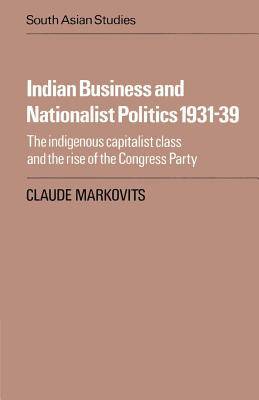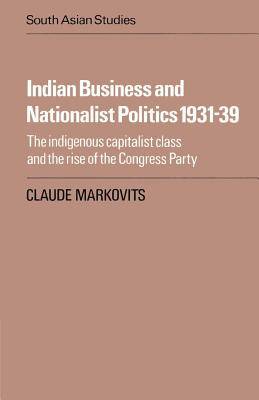
Bedankt voor het vertrouwen het afgelopen jaar! Om jou te bedanken bieden we GRATIS verzending (in België) aan op alles gedurende de hele maand januari.
- Afhalen na 1 uur in een winkel met voorraad
- In januari gratis thuislevering in België
- Ruim aanbod met 7 miljoen producten
Bedankt voor het vertrouwen het afgelopen jaar! Om jou te bedanken bieden we GRATIS verzending (in België) aan op alles gedurende de hele maand januari.
- Afhalen na 1 uur in een winkel met voorraad
- In januari gratis thuislevering in België
- Ruim aanbod met 7 miljoen producten
Zoeken
Indian Business and Nationalist Politics 1931 39
The Indigenous Capitalist Class and the Rise of the Congress Party
Claude Markovits
€ 82,45
+ 164 punten
Omschrijving
The 1930s was a critical decade in Indian politics. It saw the Congress Party begin its rise to political dominance, while Indian 'big business' strengthened its position in the economy. This book seeks to analyse the response of India's most important indigenous businessmen to the growth of political nationalism. Dr Markovits' study falls into three parts: an analysis of the structure of the business class, revealing its basic heterogeneity and lack of political unity; an examination of the impact of the Depression of the 1930s on the fortunes of Indian businessmen and on government economic policy; and a survey of the uneasy and changing relationship between businessmen and Congress at a time of political turmoil and realignment. Drawing heavily on the private papers of prominent businessmen as well as on a wealth of official sources, this is the first systematic study, on an all-India scale, of the political attitude of big business during the final and most crucial phase of the nationalist struggle. Given increasing prominence of businessmen in Indian politics after 1920 an understanding of their behaviour is fundamental to our view of the overall pattern of Indian nationalist politics. All those interested in the rise of anti-colonial movements and in patterns of capitalist development in Third World countries should also find matter for thought in this sensitive and unusual study.
Specificaties
Betrokkenen
- Auteur(s):
- Uitgeverij:
Inhoud
- Aantal bladzijden:
- 244
- Taal:
- Engels
- Reeks:
- Reeksnummer:
- nr. 33
Eigenschappen
- Productcode (EAN):
- 9780521016827
- Verschijningsdatum:
- 16/05/2002
- Uitvoering:
- Paperback
- Formaat:
- Trade paperback (VS)
- Afmetingen:
- 139 mm x 219 mm
- Gewicht:
- 326 g

Alleen bij Standaard Boekhandel
+ 164 punten op je klantenkaart van Standaard Boekhandel
Beoordelingen
We publiceren alleen reviews die voldoen aan de voorwaarden voor reviews. Bekijk onze voorwaarden voor reviews.









